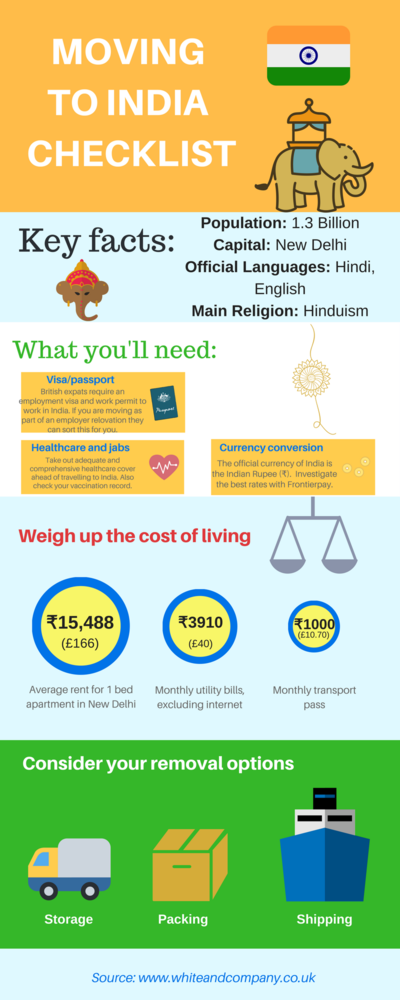Shipping to India
Are you looking to move to India but are not sure where to start? With visas to obtain, jobs to organise and living costs to account for, there is more than enough to be thinking about.
One thing you most certainly will need to consider at some point however is how you are going to move all your belongings.
You have most likely moved home before at some point and can appreciate the massive amount of upheaval and planning that goes into such a move.
Moving internationally is a whole new experience altogether and comes with added considerations and pressures. That is where choosing the right international removal company is crucial. With so many to choose from, it is not an easy task.
White & Company can help make the transition as smooth and worry free as possible.
A family-owned business established in 1871, and founder members of BAR, FIDI & Omni. White & Company have shipped thousands of people around the globe and should be your first choice for international relocations.
Why move to India?
If variety is the spice of life, India has it in abundance. From, the hustle and bustle of the major marketplaces of Delhi and Mumbai, to the peaceful spirituality and sands of Goa. India is a truly diverse and ever-changing nation with no shortage of sights and smells to experience.
It is estimated around 30,000 Brits have departed in search of India’s serious untapped potential for growth and development.
Expats are attracted to the relatively high standard of living on offer for very little cost. Most leisure activities, from eating out or watching films are very affordable in India. Although pay packets are often a fraction of those in the UK and other developed nations.
Alongside other emerging global economies (BRICs) India has experienced exponential economic growth, particularly when compared with stagnating European economies. The digital economy for one has unlocked opportunities for budding entrepreneurs and start-ups to tap into a variety of unsaturated markets in India such as the smartphone industry.
In your downtime you’ll be able to explore India’s ancient cultural heritage. Sights such as the man-made wonders of the Taj Mahal and the golden temple are a must. For the intrepid expat there is a mass of unblemished natural beauty, including jungles, rainforests and the majestic Himalayas. There is also the wide range of delectable dishes on offer, from curries to chapatis.
India is not for the feint-hearted, however. With high levels of poverty, scorching summer temperatures and a population set to overtake China, it takes time to adjust.
Once the initial culture shock has subsided you will find India is a truly fascinating and colourful country. Packed with lots of opportunities to immerse yourself in a vibrant community with excellent hospitality and plenty of opportunities.
Visas
An employment visa and work permit are needed to work in India.
Employment visas require that you be employed by an Indian company or do honorary work with a registered NGO in India. All visas have a limited time of duration, although it is possible to have them extended.
If you plan to stay in India for more than 180 consecutive days, you will need to register at the Foreigners’ Regional Registration Office (FRRO) within 14 days of your arrival. Failure to do so could mean that you are stripped of your Indian visa.
India has also recently introduced mandatory biometrics as part of its visa enrolment for visitors. The biometric-based 12-digit personal identification number is called Aadhaar (meaning ‘Foundation’ in Hindi) and is compulsory for all nationals.
Fingerprint biometrics are now also a part of the visa application process for expats looking to work in India.
Finding work
Traditionally, the bulk of expats living and working in India, were on assignment from large multinationals back home.
These were typically placed in the big cities of New Delhi and Mumbai. Some well-known employers include, Maruti Suzuki, the State Bank of India and the Tata Group.
However, in recent years there has been a real upsurge in mid-level companies taking on people from abroad.
There has also been a growth in entrepreneurs and start-ups who come to the country looking to tap into a number of unsaturated markets, most notably IT.
There is also a blossoming arts scene, particularly in Goa and demand for English teachers is always high.
Despite the reputation of being incredibly high-tech, India is generally a very difficult place to find a job without the right connections or being placed on assignment.
The sheer diversity of different languages, despite the relatively good level of English proficiency in some areas, is also a barrier.
Buying Property
Due to India’s population boom, the demand for affordable housing far outstrips supply.
Most expats will have accommodation arranged for them and their families in one of the major cities. Typically, an apartment, is part of their relocation package.
For those going alone and looking to purchase a property in India it can be very difficult. As Hindi is the most spoken language, it would be advisable to hire a local English speaking estate agent. They can guide you through your specifications to avoid viewing unsuitable properties.
They can also help you navigate the buying process which is fraught with bureaucracies. If you want to buy a property, you’ll need a bank account, various permission letters and valid work and residence permits.
The Rental Market
Unless expats are moving to India long-term, more often than not they seek to rent. Leasing can be a difficult prospect also, as landlords frequently like to side-step tax regulations by renting to people informally.
Expats should look to guarantee that a solid rental agreement is in place or risk having no proof of residency. This is a prerequisite for most administrative processes.
Typically, expats will either be offered a lease agreement of at least 12 months that is covered by rent control laws, or a lease and license agreement of up to 11 months.
The latter option is more common as they are not covered by rent control laws and so are preferred by landlords.
For a deposit you can expect to pay two or three months’ rent and the agent’s commission fee (typically around half of the agreed rental rate).
Healthcare
Public hospitals in India often have doctors and staff with good levels of English. However, because of a lack of equipment and other resources the level of state provided medical care is perceived by the Western world as being well below standard.
Waiting times can also be large and there is a long list of medication that is just not available.
Food and water hygiene is very poor in India. It is advisable to always use bottled or filtered drinking water, even when brushing your teeth.
Malaria is also rife. It is important to take adequate precautions, including covering up exposed areas and spraying a repellent with a high level of DEET.
Private Health insurance
It is generally well advised to take out adequate medical coverage for you and any family members who are moving with you.
Some international insurance providers aren’t recognised by Indian hospitals. In some cases, expats have found themselves seriously out of pocket. It is best to do your research thoroughly.
For a guide to taking out healthcare see below:
www.telegraph.co.uk/news/health
expatexplorer.hsbc.com/country-guides/india/living
Customs Information
India has a number of customs laws which must be observed. It is a good idea to do your research ahead of moving your items to India.
You’re allowed to take household goods into India duty free as long as you’ve owned them for at least a year prior to departure.
Goods must arrive within 15 days of your arrival if you ship them by air and 30 days if they’re sent over land or by ship container.
Certain items which are banned include:
Plants
Politically sensitive literature
Narcotics
Firearms
Pornography or sexually explicit material
Certain types of recording devices or cameras
For a more comprehensive list of items you can and cannot take see below:
www.indiamarks.com/moving-india
Currency & Banking in India
The official currency in India is the Indian Rupee (₹).
There are plenty of banks in the country, the four largest are State Bank of India (SBI), HDFC Bank, ICICI Bank and Punjab National Bank.
It is possible to open an Indian bank account on submission of certain documentation. For a comprehensive explanation on how you open an account and what documents you will need to provide can be found here.
Contacting White & Company
For further information on our removals service to India, or any other international destination, contact our international office on 01489 858757.
Alternatively complete the form below with your details and we will contact you.
Education
Choosing a school in India is somewhat of a minefield. Public schools in India are free for children between the ages of 6 and 14. However, these schools tend to underfunded, lack resources and do not teach in English, making it extremely hard for expats to integrate.
There are also a number of private schools but these tend to be fraught with the same types of issues and are incredibly expensive.
The admissions policies to schools are often corrupt and because of the language barrier many expats will often choose to send their children to international school. There are a wide range of these types of schools on offer and many will teach the curriculum of the child’s home country.
Places are high in demand and so it is highly advisable to apply well in advance to stand the best chance of your child securing a place at the school you want them to go to.
Fore more information and guidance on schooling options and how to apply see the following web resources:
• www.expatarrivals.com/india/education-and-schools-in-india
• www.goodschoolsguide.co.uk/international/india/

White & Company
International Removals to India since 1871
We recommend a visit from one of our Surveyors for all International moves, so that we can assess your requirements, and the volume of goods to be moved.
Popular Places to Relocate in India
- Ahmedabad
- Bangalore
- Chennai
- Delhi
- Hyderabad
- Indore
- Jaipur
- Kanpur
- Kolkata
- Lucknow
- Mumbai
- Nagpur
- Pune
- Surat
- Visakhapatnam










